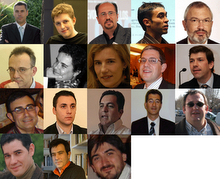The Public Sphere
One of the first and most important concepts that Habermas tackles is the public sphere. In much of his early work, Habermas's main focus was on the disintegration of the public sphere in capitalist society (McCarthy 1978, p. 381) Citado en el libro After Habermas: New Perspectives on the Public Sphere, Crosssley.
The idea of the public sphere is rooted in the Enlightenment philosophy of the eighteenth century. The philosopher Immanuel Kant coined a motto for the Enlightenment: "Have courage to use your own reason! That is the motto of enlightenment (McCarthy 1978, p. 77)." For Habermas, as for most philosophers, the Enlightenment is an exciting historical period. There is a kind of academic folklore that surrounds the Enlightenment. It is viewed as a time when people of learning came together in coffee houses and parlor rooms for the free and equal expression of thought and ideas. This period is seen as the genesis of the public sphere.
The public sphere is political. The communication that goes on is not simple small talk. It is not a place for reminiscing about the good old days. The public sphere is concerned with the evaluation of contemporary affairs and public policy (Outhwaite, 1994). According to Habermas, the public sphere has been transformed from its original content-focused openness, into something very hollow and superficial. The world in which we live day-to-day has been colonized by the market economy and legal bureaucratic regulation. Habermas is very concerned with the power and influence held by the mass media. "Whereas the press could previously merely mediate the reasoning process of the private people who had come together in public, this reasoning is now, conversely, only formed by the mass media (Habermas 1962, quoted in Outhwaite 1994, p. 9). In other words, public opinion in today's world is more a result of corporate and government manipulation than of the interaction between private citizens. Society is not controlled by critical reason and the political choice of the public. 'Publicity' has become a commodity that governments and corporations use to protect their interests and spectacular image. The public has been depoliticized, and the public sphere deformed. Habermas recognizes an ever-increasing need for repoliticization and the reformation of the public sphere.
Communication and Discourse Ethics
An excellent summary of this component of Habermas's work is the Introduction to Habermas's Discourse Ethics by Robert Cavalier, Carnegie Mellon and Charles Ess of Drury College. For Habermas, discourse is what should take place in a reformed public sphere. Creating an ethics, or set of guidelines, for this discourse is a preventative measure against disintegration. In contemporary society, fruitful discourse is often made impossible by ideologies of relativism and pluralism. Habermas poses an interesting solution to this dilemma. Discourse participants must make universal validity claims, and must respect the universal validity claims made by others (Cavalier et al. 1999). Four basic presuppositions are necessary: that what we say is comprensible, it is true, it is right, and it is sincere. It must be known in a discourse situation that these claims are made whenever a participant speaks, and that the speaker is expected to justify them if challenged (Outhwaite, 1994). Any attempt at establishing universal norms must be grounded in universal validity claims (Cavalier et al. 1999). Another way to view Habermas's discourse ethics is as a kind of unresolved openness (Unabgeschlossenheit). We must be continually aware that what someone else is saying might actually be correct (Gimmler 1999). Recognizing that this scenario is initially very difficult to understand, Habermas has provided three principles for neccessary for the development of universal norms (Habermas quoted by Cavalier et al. 1999):
The Internet provides opportunities for limited
revitalisation of the public sphere. These new
opportunities are limited to privileged groups, but it is at
least an increase in the activities of the public sphere,
however modest.
If Internet use expands into middle-income groups,
lower-income groups and women, it may yet present a
real opportunity for greater participation, democratic
communication and a true revitalisation of the public
sphere.
Based on a short period of close observation of one internet newsgroup, this study illuminates specific discursive strategies by means of which domination, cooption, resistance and exclusion enter the virtual space of internet communication

No hay comentarios:
Publicar un comentario